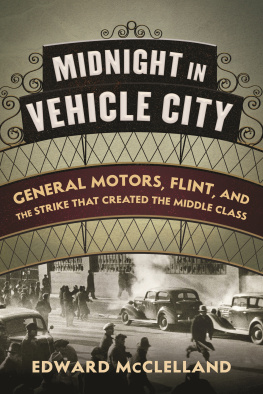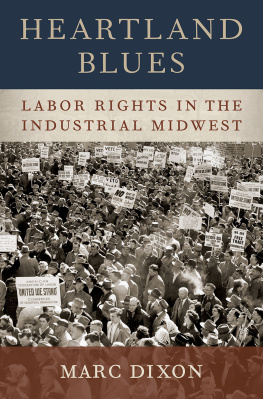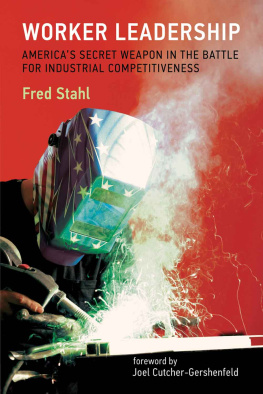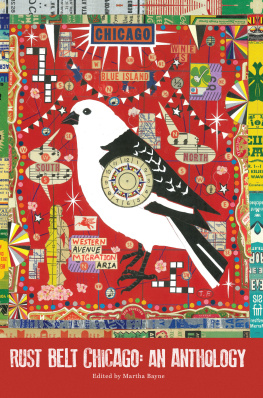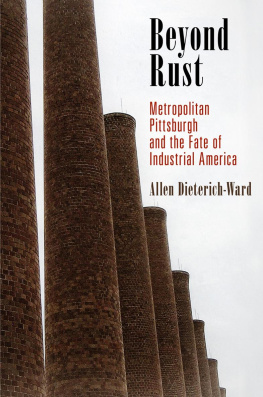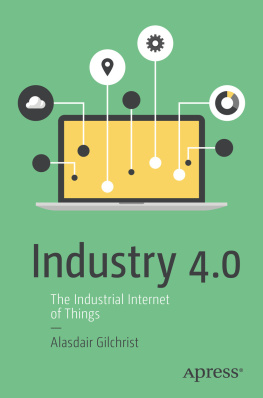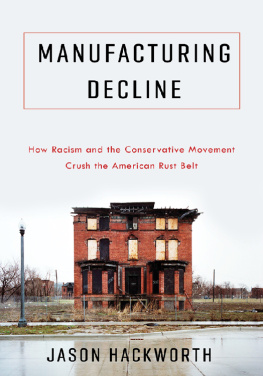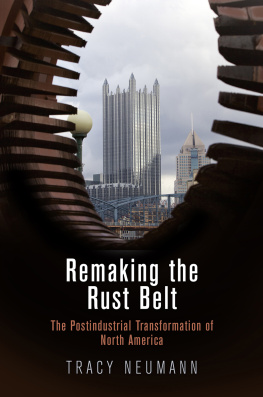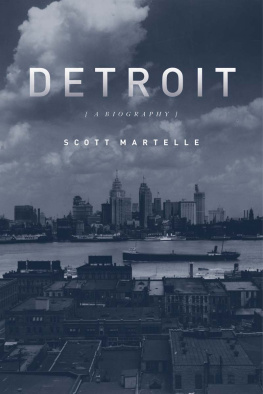Horseplayers:
Life at the Track
The Third Coast:
Sailors, Strippers, Fishermen, Folksingers, Long-Haired Ojibway
Painters, and God-Save-the-Queen Monarchists of the Great Lakes
Young Mr. Obama:
Chicago and the Making of a Black President

To Mr. Matt Mann, J. W. Sexton High School history teacher,
who taught me the story of America
Contents
Prologue
Guss Bar
For me, the glory days of American industry smelled like paint.
I went to J. W. Sexton High School in Lansing, Michigan, an art deco brick fortress that stood across the street from a Fisher Body auto plant. Fisher Body resembled an enormous backyard shed, clad in a corrugated steel skin whose shade of green was somewhere between the Statue of Liberty and mold. In the summer, Fisher Bodys emblema landau carriagebloomed in a floral pattern on the factorys front lawn. In the fall, second-shift workers stood on the balconies to watch the Sexton Big Reds butt heads across the street, in Memorial Stadium. In the spring, I ran laps around the stadiums four-hundred-meter oval, inhaling atomized paint fumes with every gaspa sweetish metallic tang I still associate with the track team. The industrial atmosphere cant have made me faster. Our band teacher, whose window opened toward the factory, developed a heart condition after years of breathing oxygen scented with Oldsmobile paint jobs.
Facing every gate was a tavern, so Fisher Bodys shoprats could speed from punch-out to bar stool in five minutes or less. Guss advertised Booze and Burgers. The Shop Stop was renowned for its postshift brawls. The bars were off-limits to students, and so was the Sav-Way, a party store, (the Michigan term for a liquor store), whose coolers were stacked with six-packs.
In Lansingas in Flint, Detroit, Pontiac, Saginaw, and all the other industrial abrasions on the palm of Lower MichiganGeneral Motors owned the air, the sky, the land, and the water. The chemically tainted air carried a new-car smell more primal than the showroom aroma. At night, the sky over the twenty-four-hour factories turned pink, an aurora automobilis that tattered constellations by outshining all but the lowest-magnitude stars. The biggest building in town was the Oldsmobile Main Plant, which had been the state fairgrounds until General Motors decided to assemble R. E. Oldss buggy alongside the Grand River. When you vaulted over the arched back of the double bridge, built to accommodate shift-change traffic, the Oldsmobile legend shone above the factory in pink neon. And if you looked down, you might see similarly unnatural colors on the water, a rainbow slick I called Oldsmo-bile. While you were trying to fall asleep, your bedroom filled with the clacket of locomotives carrying Delta 88s along tracks stitched into the coaly riverbank. When you woke up, the drop forge stamped out car parts to a Mordor beat, a half-ton hammer pounding sharply on an anvil, amplified by a copper dawn.
In the 1970s, Oldsmobile was the third-bestselling brand in America, trailing only those titanic rivals Ford and Chevy. Lansing employed twenty-five thousand autoworkers, a constituency so large that candidates for president of the United Auto Workers local bought ads on the radio.
An industrial park is not the most wholesome setting for a secondary education, but in those days, it made perfect sense. Most auto plants are surrounded by suppliersof tires, radios, door handles, floor mats. Sexton supplied labor. In 1943, when the school was built, General Motors was the largest private employer in the world. For the next thirty-five years, there might as well have been a tunnel from the graduation stage to the assembly line. One week, you had a diploma in your hand. The next, a ratchet. A healthy young man didnt even need to graduate high school to work in the shop.
I had this student, my history teacher once told me, a real chuckle-head. Just refused to study. Dropped out of school, and a year or so later, he came back to see me. He pointed out the window at a brand-new Camaro and said, Thats my car. Meanwhile, I was driving a beat-up station wagon. I think he was an electricians assistant or something. He handed lightbulbs to an electrician.
That was not the story of my generation. I started high school in 1982, the rock-bottom pits of the Rust Belt era, when Michigans unemployment rate was 15 percent. Our physics teacher began each semester with this lecture:
It used to be, he said, that you could walk out of here, walk across the street, and get a job in that plant. Thats not the case anymore. You guys are going to have to study hard and go to college if you want a good job.
Sometimes, as I walked past the plant, I would stare through the high windows, watching an auto frame jerk along in its progress from chassis to Cutlass. That was as close as I ever got. Fisher Body wasnt letting any students inside for field trips or character-building summer jobs. Auto work was not my classs calling. The morning after graduation, there was a line outside the personnel office, but that was just my schoolmates performing their parents ritual, for a god who no longer listened to prayers for $20-an-hour jobs. Generous Motors had dropped that nickname and reverted back to its sterner title: the General. And the General was not enlisting privates.
The army was, though, so my friend Larry joined up in the winter of our senior year, because he knew his father couldnt get him in at Oldsmobile. When Larry came home, three years later, his old man gave him a hard time about not finding a job right away. Across the generation gap between a baby boomer and a Gen X-er, Larry delivered a speech about how kids his age didnt have it as easy as their fathers.
I think that youve just lost touch with reality, he told his dad. I think that you have to know, if everyone had the same opportunity that you did to just walk into a personnel office, fill out a piece of paper, go to work the same day, wed all be there. Times are different. You didnt have to go to college to earn the life that you have now. You cant just walk into General Motors today.
Still, as long as Fisher Body remained standing, I knew Lansing had not been abandoned, and neither had our ideal of urban life. The twentieth-century auto plant was a great integrator, a great income leveler. Not only did blacks from Tennessee and German Catholics from rural villages build the same cars, they earned the same money as budget analysts at the state capitoloften more, with overtime. Sextons swath of west Lansing took in the biker neighborhoods by the airport, the ghetto that produced Earvin Magic Johnson, the country club, and the governors mansion. We were a statewide power in basketball and golf. A local joke went, Whats black and white and black and white and black and white? The lunch line at Sexton.
Fisher Body closed in 2005, after General Motors decided it could no longer afford to truck auto shells across town to the assembly plant by the river. GM wanted to put the entire process under one roof. I visited the obsolete factory during its demolition. The green skin remained, but cranes and bulldozers were consuming the innards. Hanging from the weave of a chain-link fence was a sign with this Big Brotherish slogan: Demolition Means Progress. The warehouse grid of windows was bulleted with broken panes, the glass torn away like paper targets on a shooting range. Peeping through the ragged holes, I saw snarled heaps of metal, the entrails of an assembly line. Down the street, Verlinden School, which had educated the West Sides middle class since the Prohibition twenties, wore a plywood bandage over its first-floor windows. An aluminum bungalow was stickered with a yellow foreclosure notice. Sav-Way, site of so many lunch-break beer runs, subsisted on an inner-city trade of baby food, lottery tickets, canned spaghetti, diapers, and Wild Irish Rose.



